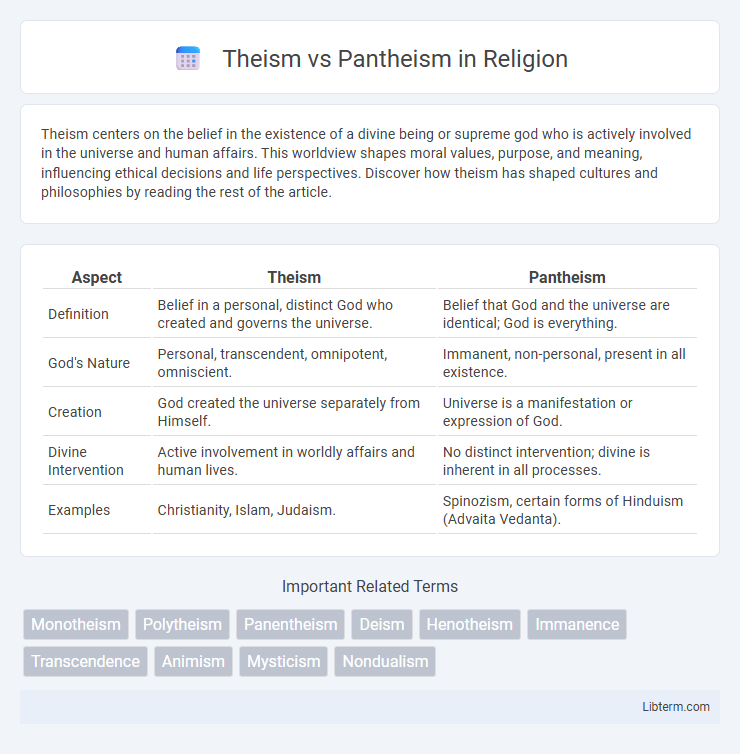Theism centers on the belief in the existence of a divine being or supreme god who is actively involved in the universe and human affairs. This worldview shapes moral values, purpose, and meaning, influencing ethical decisions and life perspectives. Discover how theism has shaped cultures and philosophies by reading the rest of the article.
Table of Comparison
| Aspect | Theism | Pantheism |
|---|---|---|
| Definition | Belief in a personal, distinct God who created and governs the universe. | Belief that God and the universe are identical; God is everything. |
| God's Nature | Personal, transcendent, omnipotent, omniscient. | Immanent, non-personal, present in all existence. |
| Creation | God created the universe separately from Himself. | Universe is a manifestation or expression of God. |
| Divine Intervention | Active involvement in worldly affairs and human lives. | No distinct intervention; divine is inherent in all processes. |
| Examples | Christianity, Islam, Judaism. | Spinozism, certain forms of Hinduism (Advaita Vedanta). |
Introduction to Theism and Pantheism
Theism centers on the belief in a personal, transcendent God who actively engages with creation and human affairs, often characterized by attributes such as omnipotence, omniscience, and benevolence. Pantheism identifies divinity with the universe itself, asserting that God and the cosmos are identical, emphasizing an immanent and unified spiritual presence in all things. These contrasting views shape core theological discussions about the nature of divinity, existence, and the relationship between the sacred and the world.
Defining Theism: Core Beliefs
Theism centers on the belief in a personal, transcendent God who actively engages with the universe and humanity. Core beliefs include the existence of a creator who is omniscient, omnipotent, and morally perfect, as well as the idea that this God can be worshipped and communicated with through prayer. Theistic traditions emphasize divine intervention, revelation, and the concept of an afterlife shaped by this all-powerful deity.
Understanding Pantheism: Fundamental Concepts
Pantheism identifies God with the universe, emphasizing that divinity pervades all aspects of nature and existence without separation. It rejects the notion of a personal, anthropomorphic deity, portraying God as an all-encompassing, immanent force present in every particle and life form. Core concepts include the unity of all things, the sacredness of the natural world, and the belief that understanding nature is equivalent to understanding the divine.
Historical Origins of Theism
Theism originated in ancient civilizations such as Mesopotamia and Egypt, where polytheistic beliefs eventually evolved into monotheistic ideas exemplified by Zoroastrianism and early Hebrew traditions. Key historical developments include the emergence of classical theism in Greek philosophy and its further refinement during the medieval period through theologians like Augustine and Aquinas. These foundations contrast with pantheism, which gained prominence later in Eastern philosophies and among thinkers like Spinoza who emphasized the unity of God and the universe.
Historical Development of Pantheism
Pantheism's historical development traces back to ancient philosophical traditions, notably within Stoicism and early Eastern religions, where divinity was equated with the cosmos itself, reflecting an immanent God. The concept evolved during the Renaissance and Enlightenment through thinkers like Spinoza, who proposed a monistic universe where God and nature are identical, laying foundational ideas for modern pantheism. This theological framework contrasts with theistic beliefs that emphasize a transcendent, personal deity, highlighting divergent interpretations of divinity and its relation to the universe.
Key Differences Between Theism and Pantheism
Theism centers on belief in a personal, transcendent God who is distinct from the universe, often involved in creation and moral guidance, whereas Pantheism equates God with the universe itself, viewing divinity as immanent and inseparable from all existence. Key differences include theism's emphasis on a separate, conscious deity and pantheism's identification of God with nature and reality without personhood. Theistic traditions typically support worship and prayer directed at a divine being, contrasting with pantheism's focus on spiritual unity and reverence for the interconnectedness of all things.
Theism and Pantheism in Major World Religions
Theism in major world religions such as Christianity, Islam, and Judaism centers on the belief in a personal, transcendent God who actively intervenes in the universe and human affairs. Pantheism, found in some interpretations of Hinduism and certain strands of Buddhism, equates God with the universe, viewing divinity as immanent and inseparable from all existence. These distinctions shape theological doctrines and worship practices, influencing views on creation, spirituality, and the nature of the divine across global religious traditions.
Philosophical Implications of Theism vs. Pantheism
Theism posits a distinct, personal God who actively intervenes in the universe, emphasizing moral accountability and purposeful creation, which shapes ethical frameworks around divine authority. Pantheism identifies God with the universe itself, dissolving the boundary between creator and creation, and fostering a holistic worldview where divinity permeates all existence. These differing ontological perspectives influence metaphysical debates on the nature of reality, consciousness, and the source of moral values.
Impact on Spirituality and Daily Life
Theism, centered on a personal God, fosters a spirituality grounded in prayer, worship, and moral accountability, often guiding daily decision-making and providing a sense of divine purpose. Pantheism's view of divinity in all nature encourages a spirituality that emphasizes interconnectedness, mindfulness, and environmental reverence, influencing daily habits toward sustainability and holistic well-being. These differing beliefs shape how individuals experience sacredness, ethical responsibility, and their relationship with the universe in everyday life.
Comparative Criticisms and Contemporary Relevance
Theism posits a personal, transcendent God who actively engages with creation, while pantheism identifies God with the universe itself, emphasizing immanence and unity. Critics of theism argue it may impose supernatural explanations lacking empirical support, whereas pantheism faces challenges in addressing individual consciousness and moral accountability within an impersonal cosmos. Contemporary relevance arises as theism influences major religious traditions and ethical frameworks, while pantheism appeals to ecological spirituality and holistic worldviews in modern environmental and philosophical discourse.
Theism Infographic

 libterm.com
libterm.com